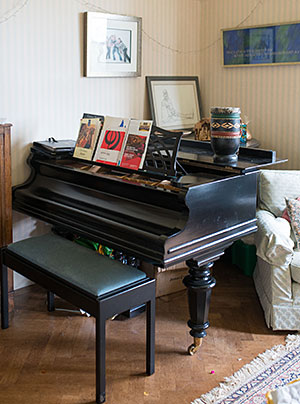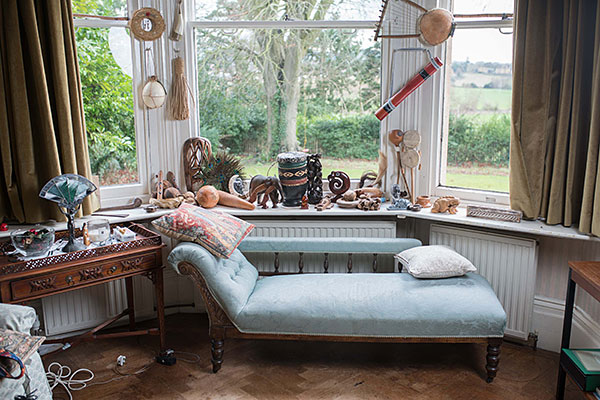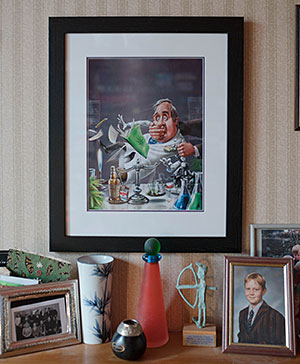Scientist David Nutt on the medical benefits of psychedelic drugs

Simply sign up to the Life & Arts myFT Digest -- delivered directly to your inbox.
We have been in professor David Nutt’s house for two minutes when he asks if I would like a cup of tea, a coffee, or perhaps a glass of alcosynth? The psychopharmacologist, widely known in the UK as the former government drugs adviser who was sacked for saying that ecstasy was safer than horse riding, opens the fridge and pours a peach-coloured liquid into two wine glasses. The kitchen is warm. A pot of butternut squash soup bubbles on the Aga. “This could be, arguably, the greatest contribution to health since the vaccine,” says Nutt, offering a glass. As we walk through to the sitting room I take a sip. It tastes like tropical squash.
Nutt, 64, is the director of the Centre for Neuropsychopharmacology at Imperial College in London, but he lives in an ironstone country house on the outskirts of Keynsham, a town between Bristol and Bath, with his wife, one of his four adult children and two labradors — Boris and Sonny. From the window is a view through trees over fields.
Nutt studies the impact of drug use on the brain. He has long argued for a more sober analysis of drugs; his book, Drugs: Without The Hot Air, was published in 2012. Both legal and illegal substances have risks but most also have benefits, says Nutt, who advocates for policy that is “evidence based”.
The psychedelic drugs LSD and psilocybin (the active compound in magic mushrooms), says Nutt, appear to cause individuals and society little damage, yet they are class-A drugs in the UK, the category considered to cause the most harm. Alcohol, he says, is one of the most harmful drugs available in regards to violent crime, health and economic productivity. According to the National Health Service, alcohol misuse costs it about £3.5bn ($5bn) each year.
“If you can’t find drugs to stop the damage of alcohol, why not replace it?” says Nutt, with a soft West Country inflection. He thinks he has found an alternative. Alcosynth, a benzodiazepine derivative, mimics the good effects of alcohol, he says, making a person relaxed and chatty without damaging the liver, gut or brain apparently.
The sitting room must be 10C colder than the kitchen. Nutt is dressed in a short-sleeved shirt with several buttons undone at the bottom and doesn’t seem to mind. He has a moustache. “Just don’t describe him as a hobbit,” said his daughter Suzy earlier, referring to an unflattering, though not wholly inaccurate, appraisal of another journalist.
In one corner is a grand piano: Nutt’s wife, Diana, sings in a choir. A Turkish rug covers the parquet floor, and African bric-a-brac — a carved elephant, a pair of wooden toucans and a pellet drum — clutters the bay windowsill. Nutt settles in a pink velvet armchair.

He seems poised to steer the conversation towards the vaping industry — a subject close to his heart judging by his Twitter feed — but I want to talk about acid. In the 1950s and 1960s psychedelic drugs were used to treat a wide array of mood disorders including anxiety, alcoholism, obsessive-compulsive disorder (OCD), schizophrenia and depression. Back then, LSD and psilocybin were legal and obtainable; Sandoz, the Swiss chemical company where Albert Hofmann first synthesised LSD in 1938, gave it away for research for free. When the US scheduled psychedelic drugs in 1970, followed by the UN in 1971, research into their therapeutic application ceased, despite a wealth of findings that many scientists deemed positive.
In the UK, Nutt and his lab are fronting a revival of research into psychedelic therapy. “They are interesting drugs because they give us insights into the brain,” he says. He quotes the US psychologist William James (brother of the writer, Henry) who took laughing gas and mescaline, a psychedelic substance found in cacti, and wrote in The Varieties of Religious Experience (1902): “No account of the universe in its totality can be final which leaves these other forms of consciousness quite disregarded.”

James wrote about depression as an “active anguish”. By his account, suffering is caused by something forced into the brain. Until recently psychologists considered depression in reverse terms — that positive thinking was somehow sucked out of the mind. Yet in the past 15 or so years neuroscientists have found that James was closer to it, that we get depressed when the subgenual anterior cingulate cortex (SACC) is overactive. Treatments for depression, from Prozac to psychotherapy, can “switch off” the SACC, but not for all patients.
In a pilot study completed last year, Nutt gave 12 patients with “resistant” depression a single dose of psilocybin. Half of them went into remission, “which is not just getting better but being cured for a period of several months”, he says. Though the findings are yet to be peer reviewed, and the sample is tiny, Nutt is excited: “This is potentially a revolution in the treatment of depression.”

It is almost lunchtime and Nutt goes to check on the soup. Feeling a mild high from the alcosynth, I wander into the hall, which is decorated with William Morris & Co wallpaper. In the study is a long desk which Nutt shares with his son, Steve, who is working on a PhD. “He’s a world expert on Zionism,” says Nutt with pride.

Nutt himself went to Bristol Grammar School and Cambridge university, completing his medical training at Guy’s Hospital, London. After a stint in the US he established the Psychopharmacology Unit at Bristol university in 1988, before moving to Imperial in 2008.
On the wall are several framed pictures. In one photo, Nutt’s children, still small, are piled into his yellow Austin Healey car. Next to it is an illustrated image used on the cover of magazine The Week depicting Nutt in a lab coat, gagged by a hand and being pulled out of frame. “The kids gave it to me one birthday.”
The relationship between drugs policy and science is fraught. In 2009 Nutt published an editorial in the Journal of Psychopharmacology comparing the risks of horse riding (in which he found one person in 350 can expect acute harm) with ecstasy (one in 10,000). He then contributed to a paper that ranked psychoactive substances in terms of damage and concluded alcohol to be more harmful than many illegal drugs.

At the time he was chairman of the UK’s Advisory Council on the Misuse of Drugs, a body of scientists, doctors, police officers and other experts who advise the Home Office. Former home secretary Alan Johnson said Nutt was asked to go “because he cannot be both a government adviser and a campaigner against government policy”.
“It’s ridiculous, isn’t it?” says Nutt. “You discover that the government is doing things exactly the wrong way for the public good and you’re not allowed to say so.”
He describes the “regulatory burden” as overwhelming: it took two-and-a-half years to acquire psilocybin for the depression pilot. Only four hospitals in Britain are licensed to hold it. “It is treated like it’s plutonium,” says Nutt. “It’s almost 50 years that we’ve denied researchers access to these drugs. A lot of our insights into consciousness would have developed much quicker.”
The train back to London is soon to leave, and the prospect of a bowl of that soup is receding. One way of thinking about the brain is like an orchestra, Nutt is saying. Different parts of the brain are like different instruments with a conductor pulling them into accord. People can get “locked” into a way of thinking, becoming inwardly fixated on cleanliness (OCD) or negativity (depression). Psychedelics knock out the conductor. “It would be a cacophony in terms of music, but what it does in the brain is somehow break down these traditional ways in which the brain is organised.”
If the regulations on psychedelic drugs were relaxed, there would be an “explosion” of psychedelic therapy, Nutt thinks. Unlike drugs that just target depression, psychedelics could be used for an array of maladies not well-served by current medicine, such as helping people come to terms with dying. In trials at Johns Hopkins University in the US, cancer patients receiving a single dose of psilocybin experienced immediate and dramatic reductions in anxiety and depression, lasting six months.
Psychedelics seem to empower people to break out of the “tramlines” of conventional thinking, he says. “With a single administration we can help people see the world in a different way.”
Photographs: Gareth Iwan Jones
This article has been amended since publication to reflect the fact that Valium isn’t used solely to treat depression
Comments